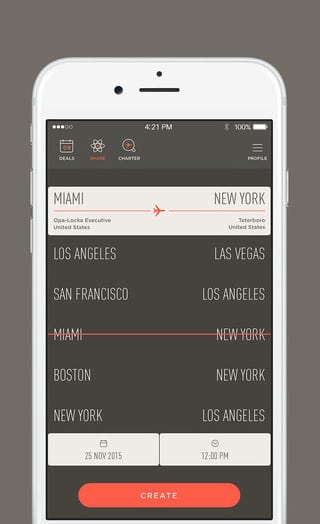 |
| The JetSmarter app. Photo: JetSmarter |
[Avionics Today 12-14-2015] With connectivity and mobile applications changing the landscape for business and commercial aviation alike, private aviation is seeing the impact in the palms of their hands. Mobile marketplace applications that allow users to book private jets directly from their smartphones, such as PrivateFly, Ubair and JetSmarter, are looking to eliminate the hassle of finding, scheduling and pricing a private jet flight for both operators and passengers — but could app companies offer the security necessary to ensure a safe and smooth trip for passengers?
The rapidly popularizing charter-booking apps have a business model similar to Uber, the popular ride sharing service for ground transportation that pairs riders with drivers and has severely disrupted the taxicab industry since its introduction in 2011. Users of apps such as JetSmarter, which launched in 2012, can book a jet through their phone in a matter of minutes and be in the air on the way to their destination within 6 hours, Sergey Petrossov, CEO and founder of Jetsmarter, told Avionics Magazine.
The company currently works directly with more than 3,000 aircraft around the world through 800 carriers to schedule aircraft, plan flights from and to anywhere around the globe, and book a single seat on flights that are already scheduled. And the app company is continuing to grow, announcing a partnership with Globair, a European private jet company to offer customer flight options across Western Europe.
JetSmarter also announced it had raised $20 million from a group of influential investors with its most recent Series B funding in July. The company is using the new capital to support its technology upgrades and expansion plans, including distributing new technologies to air carriers to better streamline the booking process, launching new private jet sharing services, opening customer support offices in Europe, Middle East, South America and Asia, as well as expand its private jet services around the globe, according to JetSmarter.
“You simply drive to the tarmac, park right beside your jet and then you’re taking off within a matter of minutes. Our goal is to one day make all air travel private aviation accessible to the masses, not just a privileged 1 percent,” said Petrossov.
The company works directly with its operator partners, who maintain their own aircraft, and performs its own safety audits as well as rely on third-party safety auditing companies such as Wyvern and ARG/US to ensure maintenance, safety and mandate compliance for the aircraft involved in the operation. Petrossov also noted that having a reliable in-flight Internet connection on all of the flights involved with the app is paramount in this digital age, as the app relies on Internet connectivity and thus aims to ensure its members are always connected.
The popularity of such apps seem to be picking up. Jetsmarter alone has seen significant growth since its launch in March 2013, growing 15 to 20 percent each month, according to Petrossov, and logging more than 300,000 app downloads. But James Butler, CEO of Shaircraft Solutions, a consulting firm for the private aviation marketplace believes the “Uberization” of private air travel is simply the digital version of an established concept: the third party charter.
“In a private aviation market environment in which there is underutilized capacity, e.g., aircraft sitting on the ground, creative marketers are wont to dream up ‘programs’ with catchy names and slogans that make use of this excess capacity,” said Butler, noting that the companies simply serve as charter brokers, matchmaking private fliers with owners and operators.
This can lead to safety concerns, which Butler claims are “paramount.” While the companies look to private services such as ARG/US and Wyvern to vet the aircraft, it can be less transparent to the customer as to whether the equipment is well maintained, the pilot is experienced, and the provider has a well-established aviation and financial pedigree.
“Flying at 40,000 feet is not like taking a two block ride in someone’s car, especially so if the company you are paying to has little experience in the business, and only the most tangential relationship to the person ‘driving’ the car, and the cost of the flight is perhaps 5,000 times greater than that short ride,” said Butler. “There are few fender benders in private aviation.”
While Uber-like jet apps aim to make access to charter aircraft quick and easy for both the flying elite and the common traveler alike, Butler warns that passengers should fully vet any and all aircraft programs they look to take part in.
“It’s essential that you see beyond the fancy marketing and do extensive due diligence to make certain that you are making the right choice,” Butler said. “Look behind the cool app and ask the right questions — who is really operating the aircraft? What type of aircraft is it and what is its vintage? What safety equipment does it have? What is the pilots’ experience flying this aircraft? What is the cancellation policy? And so on.”